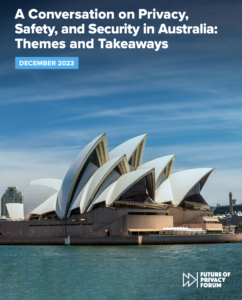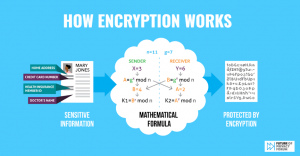When handling personal data, organizations must utilize both best practices for privacy and cybersecurity to ensure that it is protected, sound, and treated in line with individual and societal expectations.
FPF’s work on privacy and cybersecurity focuses on the overlap between the two areas, including how different global laws and policy regimes tackle that overlap. Through FPF’s Privacy and Cybersecurity Expert Group, FPF facilitates the coordination and collaboration of privacy and cybersecurity experts to promote common goals, strategies, and understanding.
FPF’s Cybersecurity Advisory Committee comprises top cyber and privacy executives at industry-leading companies and civil society and academia representatives.
Advisory committee members include:
- Emily Hancock, Cloudflare
- Stephenie Handler, Gibson Dunn (Chair)
- David Hoffman, Duke University, Sanford School of Public Policy
- Anitha Ibrahim, Amazon Web Services
- Andy Serwin, DLA Piper
- Chad Sniffen, National Network to End Domestic Violence
- Melanie Tiano, T-Mobile
- Heng Xu, American University
Featured
WannaCry About Backdoors
There are many lessons to learn from the spread of the WannaCry ransomware attacks across the globe. One lesson that needs more attention is the danger that exists when a government attempts to create mandatory backdoors into computer software and systems.
Homomorphic Encryption Signals the Future for Socially Valuable Research on Private Data
Encryption has become a cornerstone of the technologies that support communication, commerce, banking, and myriad other essential activities in today’s digital world. In an announcement this week, Google revealed a new marketing attribution tool that relies on a particular type of advanced encryption to allow advertisers to understand whether their online ads have resulted in in-store purchases.
Good Data Collaborative to Advance Responsible Data Use
The Good Data Collaborative seeks to identify gaps in resources to assist civil society in using data responsibly through distinct activities: a landscape assessment of existing tools and resources, as well as academic literature; a consultation with key stakeholders and current and potential users of the resources; and a redesigned, central repository of resources to help them address responsible data challenges in their work.
FPF Talks Corporate Email Security with NPR
On November 1, 2016, Jules Polonetsky was featured on NPR’s Marketplace to discuss corporate email security. In light of recent hacks, it is imperative for companies to educate employees about best practices. Jules discussed the importance of two-factor authentication for log ins and encouraged employees to use strong passwords.
Big Data and Elections
Big data analytics offers, “great new ways to engage with voters on the things that really matter to them, which results in more motivated, and hopefully better informed, participants in the electoral process, and likely higher turnouts on election day.”
Protecting the Privacy of Customers of Broadband and Other Telecommunications Services
The Future of Privacy Forum filed comments with the Federal Communications Commission (FCC) in response to the FCC’s proposed rules regarding the privacy and data practices of Internet Services Providers (ISPs). The FCC’s March 31, 2016 Notice of Proposed Rulemaking (NPRM or Notice) seeks to regulate ISP’s data practices pursuant to Section 222 of the Communications Act – a sector-specific statute that includes detailed requirements that apply to telecommunications services, but does not apply to other services offered by broadband providers nor to online services operating at the edge of the network (e.g. web sites).
June 28th Event: Ensuring Individual Privacy in a Data Driven World
Criteo and The Future of Privacy Forum are pleased to invite you to an exceptional conference gathering a very high-level selection of regulators, lawyers, advertisers, publishers and politics to discuss about individual privacy in a data driven world.
Enhancing Usability for Online Privacy Controls
Today, Google announced new features that provide users with additional customized options and controls over personal data, as well as easy-to-follow instructions and notifications that explain users’ choices in simple terms. The new features make privacy controls quicker to find and easier to understand and operate.
Student data privacy: Moving from fear to responsible use
Data has always been an inherent part of the educational process – a child’s age, correlated with her grade level, tracked to specific reading or math skills that align with that grade, measured by grades and tests which rank her according to her peers. Today this data is ever more critical.
Essentially Equivalent:
“In a milestone decision on transatlantic data protection, the Court of Justice of the European Union (CJEU) issued its judgment in the Schrems case, declaring the Commission decision on the EU-U.S. Safe Harbor agreement invalid. The CJEU declared that such a decision requires a finding that the level of protection of fundamental rights and freedoms in the laws and practices of the third country is “essentially equivalent” to that guaranteed within the EU.”














